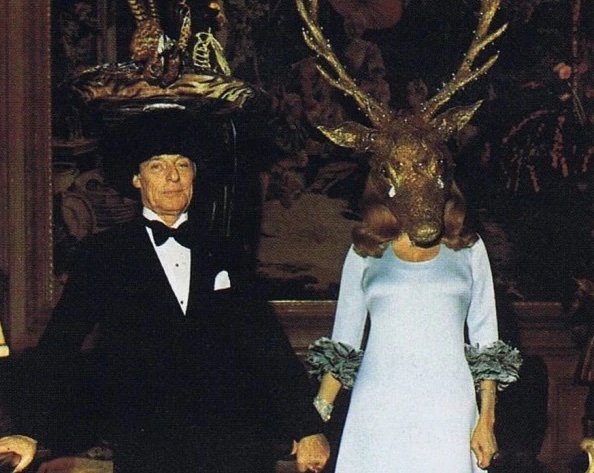
May 02, 2024

Surrealist Ball Rothschild
Numbskull journalist ignoramuses refer to this week’s Met Gala as the party of the year. Sycophantic hacks who can’t tell the difference between a hooker and a nun cannot be expected to know better, so never mind. The lyrical aplomb of yesterday’s balls and parties is terra incognita to them, whereas today’s vulgar, hyperbolic culture requires the gruesome exaggeration they provide. The Met Gala is now a Frankenstein monstrosity, a barbarity against refined taste, a grotesque copy of a once-wonderful occasion. When Pat Buckley ran the show I was a regular, as were many of my upper-class buddies. No longer. From the divine presence of chic ladies like C.Z. Guest and Babe Paley, it is now down to the Kardashians and Puff Daddy, as precipitous a descent as that of Harvey Weinstein. Pachyderms like the grotesque Lizzo are now considered glamorous, while the high-octane glamour of the ’50s is as gone with the wind as Confederate statues.
Back when I was young, balls were given nonstop in order to celebrate a whim, not to sell material things, as is the case today. Hostesses felt like giving a party and did. Charity balls were the exception, but it was a particularly American perversion, as throwing a blast just for fun had begun to rub the wannabes the wrong way. The best ones that I attended as a young man took place in Paris, before the place was taken over by North Africans. There was no unvarnished shabby chic back then, no grunge-inspired outfits, no fashion nerds, no freaks, no men in dresses—just glamour and beautiful designer gowns for the ladies.
If memory serves, the grandest of the grand balls were given by Sheila Rochambeau, born Sheila Mackintosh somewhere in the Midwest of America, who married a descendant of the great Revolutionary War French hero who carried the day against General Cornwallis in Yorktown. Her magnificent château outside Paris was the venue, and—her words—when I asked her how come an unknown 19-year-old was invited, “Because you’re good-looking, young, and have good manners.” The latter counted rather a lot back then, and invites galore followed: The Agnelli ball in the Bois de Boulogne, the Rothschild ball at their spectacular château de Ferrieres, the Rede ball in the Isle de Louis, the Thurn und Taxis dance at their historic Regensburg castle, I could go on and on.
The party sort of ended in 1968, when French students revolted in sympathy with the workers, and I had the opportunity to get around Paris on my best polo pony, Tango, as the capital had run dry of gasoline and bicycles were harder to find than petrol. Europe had been revived after the catastrophe of the war, South Americans with bulging pockets had come over, and the Italian and German economic miracles had taken place. Hosts and hostesses were eager to party and celebrate and did so with a vengeance. Things slowed down after 1968, while Paris and Prague burned and the Vietnam War split the US of A apart. It was time for serious work, and I turned to writing. But when asked in various stages of my life for the best party of them all, it was one I happened to have missed, back in 1815, a party that celebrated a congress that kept the peace for close to one hundred years.
The Congress of Vienna followed Napoleon’s defeat and exile to Elba in 1814, as the future of Europe hung in the balance. Britain, Austria, Prussia, and Russia were the big shots, along with a host of lesser powers, gathered in Vienna for an eight-month-long political and social carnival that has never taken place before or since. It resulted in an unprecedented level of European stability for close to 100 years.
There were crowned heads galore who insisted on being entertained, with nightly balls and parties organized by ambassadors, princesses, and grand visiting hostesses. The entourages of crowned heads, of ministers, of ambassadors, equerries, aides-de-camp, ladies-in-waiting, when added to the Austrian court and the society of Vienna, made up the largest aristocratic gathering that had ever been. I will only mention two events among the nonstop partying because of personal reasons. Luigi Boncompagni Ludovisi, Prince of Piombino, interrupted the festivities when he demanded to know with what right did the allies deprive him of his island of Elba to accommodate the man who had deprived him of his possession. Luigi was right but only got his isle back when Napo escaped a year later. Almost 200 years after that, I found myself in his descendant’s Roman palazzo when my daughter’s closest childhood friend, Delphina Lapham, married Bante Boncompagni Ludovisi.
Princess Katya Bagration was the greatest beauty of her time. She was the widow of Prince General Bagration, who was killed during the battle of Borodino back in 1812. The Russian was a man-killer. When she arrived in Vienna, she set her eye on Prince Metternich, already very busy with carving up Poland, satisfying his loving wife as well as his demanding mistress Wilhelmina, Duchess of Sagan. But during some important negotiations about Poland, Metternich got lucky with Katya Bagration and missed the meeting. When informed by his aides that a very large portion of Poland could have gone to the Austrians if he had been there, Metternich looked wistful for a moment, then exclaimed, “She was worth it.”
That all was back when men were men.